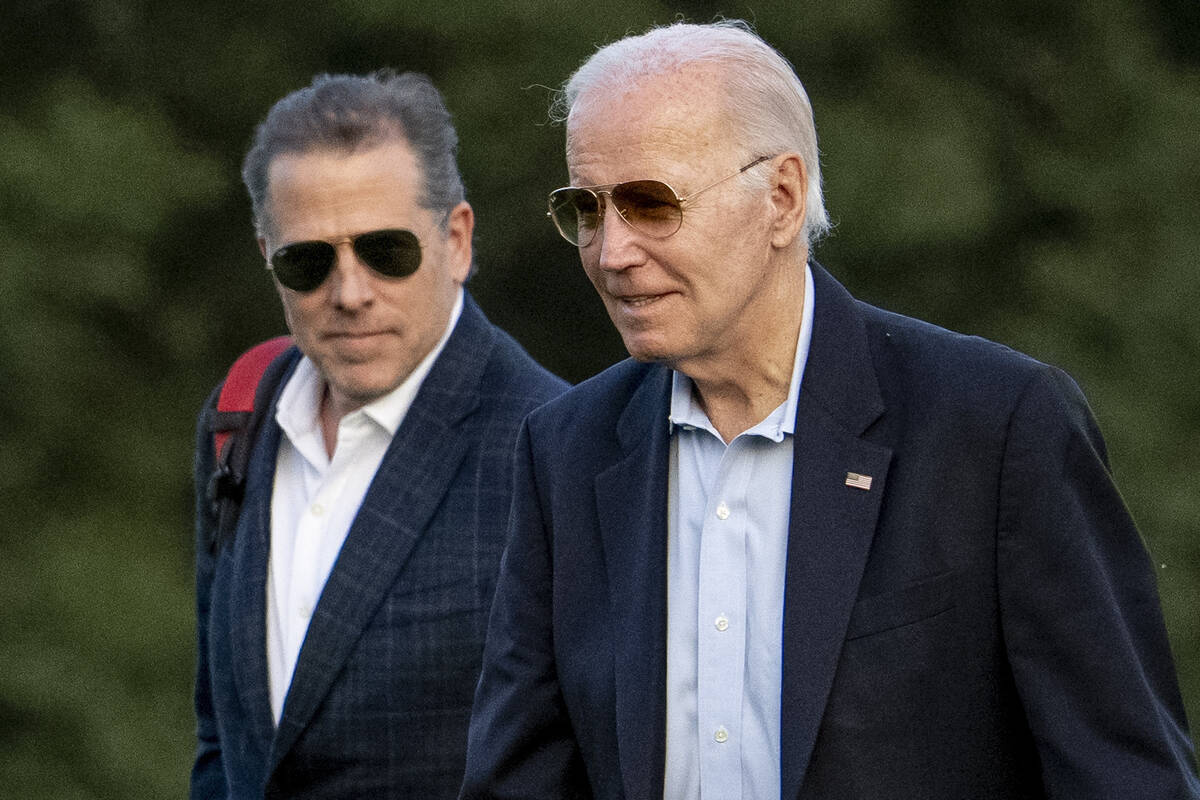CLARENCE PAGE: Why did Joe Biden not keep his promise about Hunter?
Just once amid all the times that reporters asked President Joe Biden whether he would give a pardon to his son Hunter, who was facing a possible federal prison sentence, I wish I could have heard jolly Joe give the sort of response that the late Chicago Mayor Richard J. Daley offered to such unwelcome questions.
I’m thinking of the time in the 1970s, still remembered by old-timers like me, when Daley jousted with reporters’ questions about his efforts to steer city insurance contracts to his sons.
To anyone who thinks a father can’t help his sons, he responded, according to various accounts, something to the effect of “There’s a mistletoe hanging on my coattails.”
In other words, mind your own beeswax. Such was the simplicity of “the Chicago Way.”
In those days, nepotism was not such a dirty word. It was, in words also attributed to Daley, a way for a public servant to “put his arms around his sons and help them.” Or to solidify an alliance, such as by hiring the offspring of a peer alderman or county board member.
Compared with those standards, Joe Biden took quite a risk to his own reputation when he repeatedly made a promise to refrain from interfering in Hunter’s federal case despite his constitutional right as president to pardon people of crimes. The president probably would have been better off by letting his pardon power speak for itself without making promises he could not keep.
Historians will no doubt explore what Joe Biden was thinking in promising not to involve himself in the case against Hunter. But for now, it’s not hard to imagine that the president saw himself standing on firmer ground before Donald Trump’s re-election changed the outlook for Hunter Biden’s fortunes.
That’s one plausible explanation for why the elder Biden shocked many by announcing on Dec. 1 that he was going back on his word and issuing a “full and unconditional pardon” of his son.
Now he’s taking hits from a lot of Democrats in addition to the predictable Republicans who condemn the pardon as self-serving and hypocritical.
The president’s decree went so far as to cover not only the crimes of which he had been convicted, but also any “offenses against the United States which he has committed or may have committed or taken part in during the period from January 1, 2014 through December 1, 2024.”
That’s pretty thorough. Yet it’s not hard to see that the president anticipated the potential for further legal jeopardy for his son, including the possible referral of charges from the U.S. House Oversight Committee, which has been investigating the Biden family separately from the Justice Department’s prosecution of Hunter.
And let’s not forget we’re talking about Donald Trump, who seems to be looking for revenge against those who pursued him and his associates for alleged misdeeds in office and out. Yes, we have heard this from no less than Trump himself.
Recall also that Trump’s first impeachment in 2019 was predicated on allegations that he unlawfully solicited Ukrainian authorities to deliver evidence against Hunter Biden to influence the 2020 U.S. presidential election. Trump was saved from conviction by a near party-line vote in the Senate.
Two weeks before the 2024 election, NPR counted more than 100 threats from Trump himself to investigate, prosecute, imprison or otherwise punish his perceived opponents.
Trump escalated his “retribution” rhetoric against his fellow Americans whom he labeled “the enemy from within” and threatened to send in the National Guard or other military if “radical left lunatics” try to disrupt the process.
That’s our Donald. We’ve become accustomed to his sort of bloviation by now — and his retribution approach to justice.
The election is over. Prepare to live with the consequences.
In announcing the pardon, the text and tone of the president’s letter offers strong suggestions of those concerns, as he describes how he “watched my son being selectively, and unfairly, prosecuted.”
Putting on his lawyer hat, he argues in the statement that his son is being overcharged for the crimes.
“The charges in his cases came about only after several of my political opponents in Congress instigated them to attack me and oppose my election,” Biden wrote in his pardon statement.
“Then, a carefully negotiated plea deal, agreed to by the Department of Justice, unraveled in the court room — with a number of my political opponents in Congress taking credit for bringing political pressure on the process,” the statement continued. “Had the plea deal held, it would have been a fair, reasonable resolution of Hunter’s cases.”
That might have been just, but it didn’t get a chance to happen.
I sympathize. I can only imagine how I would respond if I felt the power of the state being brought down on my son in trumped-up charges as retribution for something I, not he, may have done.
Resolving such tough disputes between the powerful is a major reason why the nation’s founders gave presidents the power to pardon. It’s not a perfect system or immune to abuse. But, it moves us in the right direction — toward justice.
Contact Clarence Page at cpage47@gmail.com.






















